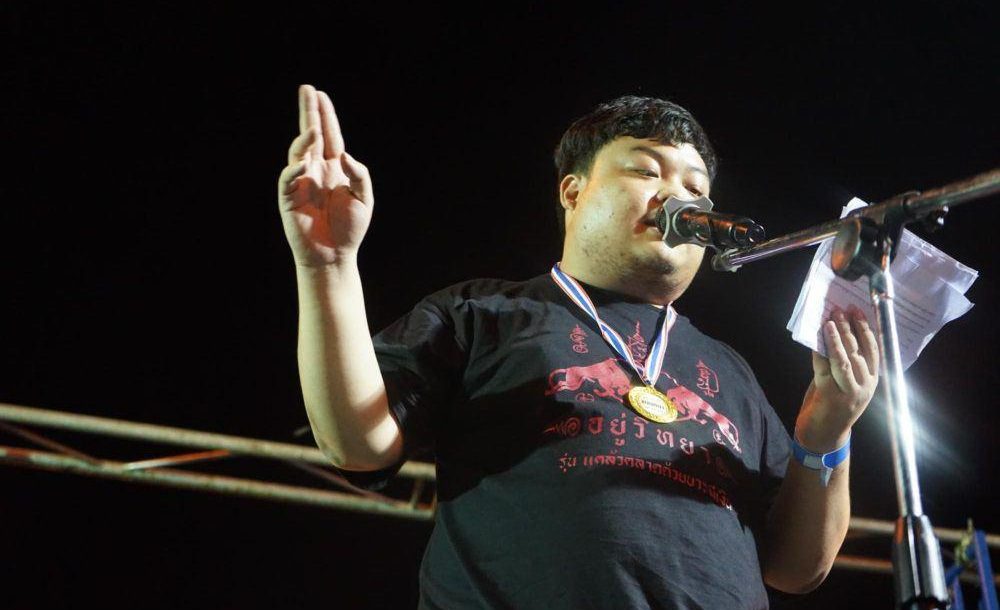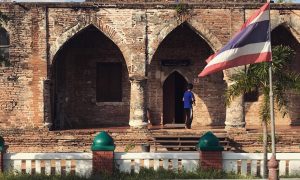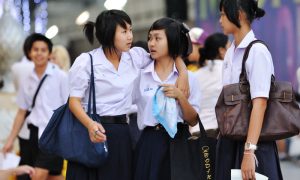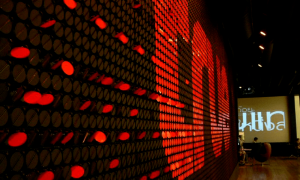The 10th of August 2020 will be remembered as either a key date in Thailand’s transition to democracy or as a precursor to yet another coup carried out by a military pledging itself to the defence of the monarchy.
On that date, a representative of a group of students at a protest held at Thammasat University publicly made a unique set of demands: strip the monarch of legal immunity, revoke the lese-majeste law and pardon all those jailed for the crime, clearly define which assets are held privately by the king, reduce tax money supporting the institution, abolish all royal offices, open all money given to royal charities to public scrutiny, forbid the monarch from expressing political opinions, cut all royalist propaganda, investigate the disappearances and murders of critics of the monarchy, and outlaw royal consent to coups.
In democratic countries which have monarchies, most of these demands are rather commonplace. But in Thailand, it was a singular event given the draconian lese-majeste law. At the same time, the demands were very much saying out loud what many Thais have been thinking privately for a long time.
It was a stunning set of demands to be made publicly, speaking to the courage of the group of students behind the effort. But the appearance of student protests demanding far-reaching reforms to the monarchy was the outcome of a long process, more than ten years in the making.
The “J-Park” pledge
The creation of the 10-point announcement began on a quiet night in mid-July this year when a group of TU students—Parit “Penguin” Chiwarak (21), Panusaya Sithijirawattanakul (22), Natchanon Pairot (21), and a student who requested anonymity—held a meeting in a dorm called “J-Park” near Thammasat’s Rangsit campus.
At the time, students throughout the country were mounting protests demanding three things: the dissolution of parliament, an end to the harassment of government critics and a more democratic constitution. In June and early July, a series of precipitating factors pushed student protest leaders onto a more confrontational path.
In early June, Anon Nampa from Thai Lawyers for Human Rights submitted a complaint to a parliamentary committee calling for an end to the legal harassment of critics of the Thai monarchy active on the Facebook group, “Royalist Marketplace.” Set up by exiled government critic, Pavin Chachavalpongpun, the site has been a space for Thais to exchange information and voice their opinions about the monarchy. The group is particularly popular among students.
The page has attracted the attention of royalists who have subjected members to a witch hunt. Anon said personal information of some 25 members had been revealed, subjecting them to attacks by internet royalist trolls and 14 others have been threatened or charged by the police. The military-led government has tried, unsuccessfully, to pressure Facebook to close the page, ironically helping to advertise the page further. The page’s members rose from about 500,000 in early June to almost 900,000 by the end of August.
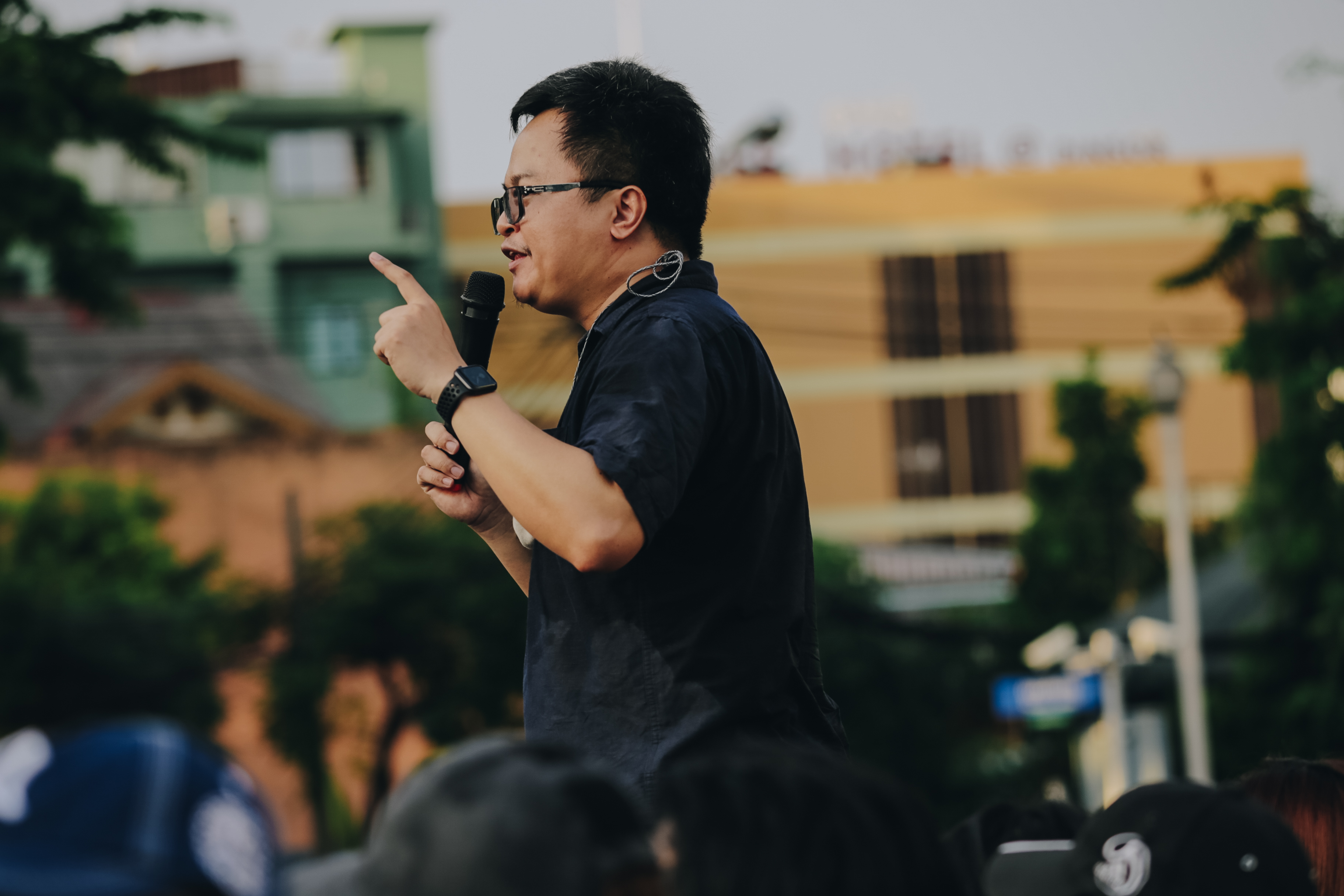
Anon Nampa (Credit: Prachatai)
Students also responded when a Thai activist in exile, Wanchalearm Satsaksit, was kidnapped in Cambodia on 4 June and presumably killed. Wanchalearm had been on the Thai military government’s list of 29 exiled activists accused of violating lese-majeste. Since 2014, at least eight such activists who had taken refuge in neighbouring countries have been abducted and disappeared or found dead.
Although monuments to the 1932 overthrow of the absolute monarchy have disappeared from Bangkok as of late, university students nonetheless observed the 88th anniversary, once-called “Nation Day,” on 24 June. They not only called for constitutional changes, but highlighted aspects of the People’s Party announcement, which was particularly critical of the monarchy.
Then on 9 July, a Khon Kaen man who persisted in wearing a shirt that said, “I’ve lost faith in the institution of the monarchy,” was seized and thrown into a psychiatric hospital. The Student Union of Thailand called for his release and staged a protest in front of the hospital.
Amid these events, the four students who met at J-Park knew that publicly voicing their private thoughts about the monarchy would be a grave step. Still, Parit told us in an interview, “No one in our group has thought about leaving Thailand. We would be happier to fight from jail than attack [the monarchy] from abroad. We saw so many Thais in exile, unhappy with their lives.”
The group tested the waters by posting on their Facebook page, United Front of Thammasat and Demonstration, that they planned to make an announcement on the monarchy on 10 August and called for donations and volunteers to help organise activities. To their surprise, they received many offers to help.
On 3 August, Anon Nampa, the human rights lawyer, delivered a blistering speech about the monarchy at a demonstration at Democracy Monument. Dressed as Harry Potter and using “magic” to reform the monarchy, his public criticism of the institution became the talk of the town. The J-Park group steeled themselves, deciding that “it’s time for change.”
In the wee hours of 10 August, Thammasat University student Pattaraphong Noipang and Parit struggled to finalise a 10-point manifesto, which they shared with the group by email that day. Both were aware that Somsak Jeamteerasakul, then an academic at Thammasat, was vilified after he introduced a similar seven-point declaration on 10 December 2010 in a seminar. The attacks began when a columnist from the rightwing Manager Online penned that most Thai could not accept what Somsak had written.
“Panusaya volunteered to read the manifesto to the crowd,” Parit told us. “After she read [the document], she said it was frightening but that she liked it and said that she would read it.”
Besides Parit and Panusaya, no one else in the group wanted to appear in public. It wasn’t just risky for Panusaya to appear at the demonstration that night—it was her first time speaking from the stage at a rally. A student at the Faculty of Sociology and Anthropology at Thammasat University, she became interested in politics when observing and then participating in the Assembly of the Poor, which fights for environmental and land rights.
“I thought if Parit got arrested, no one else would be able to run the rallies. I have no experience dealing with people like that so I was willing to be sacrificed and go to jail,” she said.
Despite her nervousness, the receptiveness from the audience to the students’ announcement was undeniable. When she started with a principled but straight-forward critique of the institution, she was greeted with loud cheers.
Protesters responded particularly positively to the calls for revising the monarch’s constitutional immunity from prosecution, the amnesty and release of all of those imprisoned for lese-majeste, and investigations into the disappearances and killing of the monarchy’s critics.
Days later, Panusaya told us matter-of-factly, “I think that if I have to go to prison, I would have to spend about ten years there—until I’m 32. When I get out of prison, I’ll keep fighting.”
An opening from above
The announcement of the J-Park students on 10 August was bold. What is more important, though, is the response they received from the protesters listening. That enthusiasm tells us something crucial: a significant segment of Thai youth is completely unsentimental about the monarchy. They have never been enthralled by it, unlike so many older Thais.
Although the organisers of another student protest in Bangkok on 17 August told speakers to avoid mentioning the monarchy, Parit repeated the 10 demands on a stage before thousands of high school and university students before Democracy Monument in Khon Kaen on 20 August to an equally enthusiastic audience. In a 24 August protest at the same location, representatives of community groups in the Northeast, particularly the Assembly of the Poor, endorsed the students’ demands, again to the cheers of protesters.
Had Panusaya read out the 10 points a few years earlier, she would have likely been arrested and put in jail. An analysis of the 94 people accused and tried for lese-majeste (Section 112 of the Criminal Code) from the day of the 2014 coup until the end of December 2017 found that only 15 (or about 16 percent) were allowed bail, and 96 percent were found guilty and imprisoned.
But for reasons that remain unclear, in 2017 the king “instructed” that the lese-majeste law no longer be invoked. In principle, people could have begun openly voicing critical opinions about the monarchy. But few have taken the opportunity, especially since the government has used sedition and computer crimes laws to silence critics instead.
Still, the changing legal trend sends an ambiguous message to Thai society. In June, Prime Minister General Prayuth Chan-o-cha, for no apparent reason, reiterated the king’s order, saying, “What I want all Thais to know is that lately Section 112 has not been used. Do you know why? Because the king has mercy and advised us not to exercise the law.”
The Prime Minister also noted that “distorted” information was circulating, and that “abuse and insults” towards the monarchy were on the rise. A Bangkok Post columnist questioned how the government would deal with the “hundreds of thousands of social media threads” which exhibit a “so-called anti-monarchy sentiment.” Would these “noticeable debates about the institution of the monarchy” grow into a larger critique about “the relevance in Thai society today” of the institution itself?
The 10 demands answer this question. Instead of continuing the rather staid debate over lese-majeste, the J-Park students have shifted the discussion towards larger questions about the legitimacy of the monarchy’s role and the very form of Thailand’s government itself.
What’s new, what’s old in the student movement
A seismic shift has occurred in Thailand, one that will inexorably shake the foundations of a governmental system almost a century old. But despite these new developments in the history of activism in Thailand, some aspects of the current student movement have certain connections to the past.
Lèse-majesté’s new face hides old tricks
Modern techniques to block online criticism of Thailand's monarchy are paired with the familiar stirring of royalist-nationalist sentiment.
Many joined the People’s Alliance for Democracy (PAD) in 2006, or “Yellow Shirts,” and then reappeared in 2013 under the auspices of the People’s Democratic Reform Committee (PDRC). Somewhere along the way, they lost sight of civil and political rights and ended up, ironically, supporting the monarchy and lese-majeste prosecutions (or at best were silent on the issue.)
On the other side were the supporters of Thaksin, who was ousted in the coup of 2006. Eventually this group, the Red Shirts, somewhat outgrew its connection to Thaksin and became a larger umbrella group under which most democratic groups aligned. For them, the democratic struggle began with Pridi Banomyong and reached its height as a mass movement under the Red Shirts who were represented by a rising lower- and middle-class from the provinces and common people from the North, the Northeast, and edges of Bangkok. For them, the ammat (Bangkok elite-royalists) and their middle-class allies (“slim” or salim) have jealously held onto power, subverting the outcomes of elections by time and again overthrowing democratically elected governments or engineering their removal by the courts.
The newer generation of Thai youth represents a bridge to this divide in civil society. The current student protesters oppose both the 2007 and 2017 “Yellow-Shirt” constitutions and poke fun at the failed “slim” class that supported these coup-derived charters. Yet they have not adopted the discourse of ammat, but rather speak of needing to do away with Thai sakdina or feudalists. Their heroes of history are not so much Pridi or Jit Phumisak but rather the People’s Party whose attacks on the monarchy in 1932 they have revived.
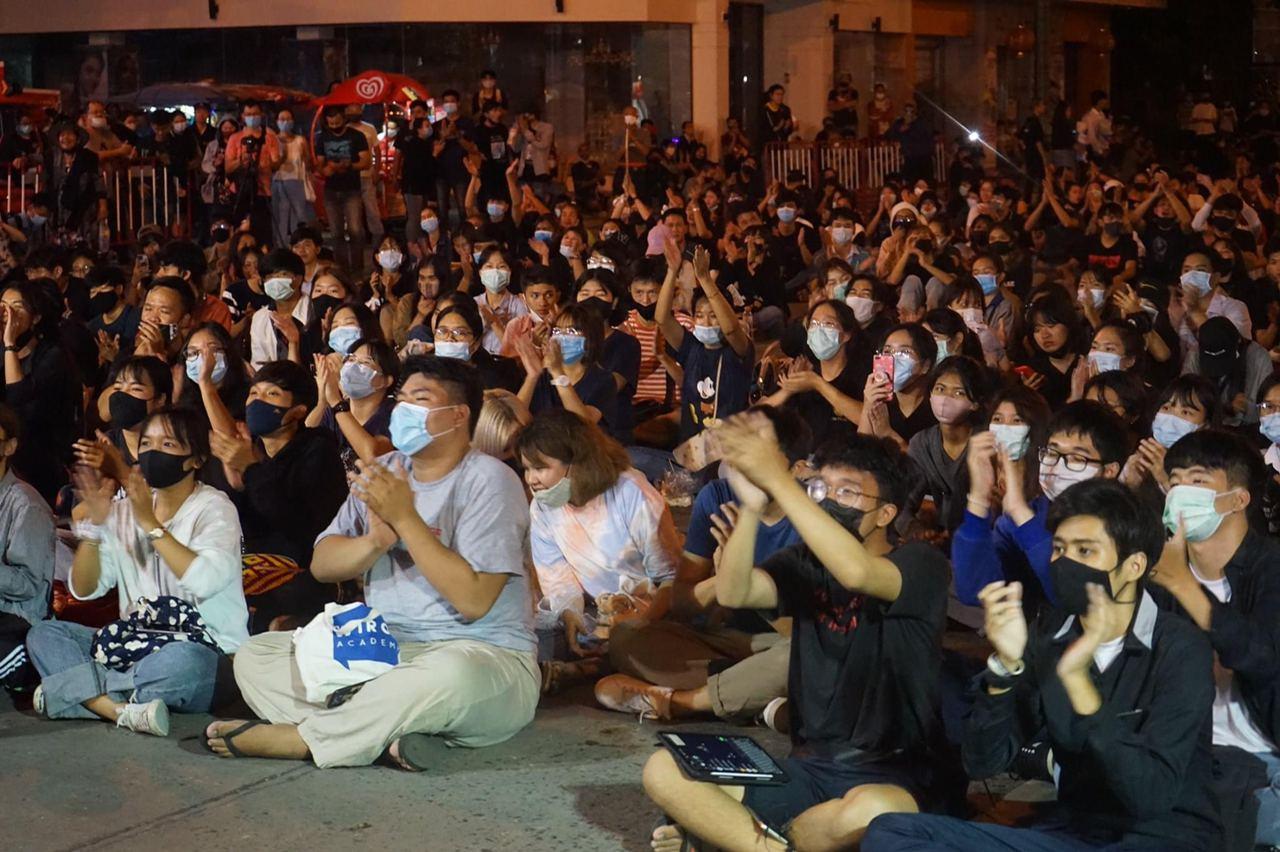
Thousands of protesters—mostly
university and high school students—cheer at the Democracy Monument in Khon Kaen on 20 August. (Credit: The Isaan Record)
While the Red Shirts and Yellow Shirts in Isaan have remained largely silent about the student protests, it’s significant that, at least in Isaan, many Red Shirts and formerly Yellow Shirt-leaning NGOs came out to the protests in Khon Kaen on 20, 22 and 24 August, though remaining at the sidelines.
There seems also to be at least a segment in the student movement which is calling for something more extensive than mere decentralisation, an issue often unspoken but arguably also close to the heart of political conflict in Thailand. Community rights groups have always pressed for greater local control of natural resources, but otherwise largely skirted around the issue of decentralisation. Yellow Shirts always wanted to impose greater centralisation, while Red Shirts never made any clear policies about decentralisation.
The J-Park group is advocating for a literally new form of government, at least within the narrow range of meanings allowable in a Thai context. They are calling for a federated state which would, perhaps even more than reform of the monarchy or elimination of the military from politics, have a more expansive effect on the kinds of “Thailand” which can be imagined. Such a vision may, as such, pose an even greater threat to the Bangkok elite.
J-Park after the announcement
Panusaya’s family has become very worried about her safety since the 10 August declaration.
“If I go anywhere, I have to have a friend go with me. It’s made me more careful,” she noted. “But I hope that the monarchy is reformed. It needs to be. Even if not all 10 points are addressed, it might be enough. We think that if 3.5% of citizens join the protest, it has to change.”
Panusaya’s life has changed rapidly. Within the past two months, she was elected a leader of the student political party, the Dome Revolutionary Party, and also a member of the Student Union of Thailand.
Panusaya doesn’t feel that her views are different from others in her generation. “Recently, society has been so active,” she said. “I think most people think the same as us but they don’t speak out in public.”
Panusaya and Parit dream that someday the monarchy will be so diminished that it no longer holds any power.
“It’s been difficult to reconcile democracy and having a monarchy in Thailand. So we need to start working on the ten demands,” Panusaya said.
 Facebook
Facebook  Twitter
Twitter  Soundcloud
Soundcloud  Youtube
Youtube  Rss
Rss 